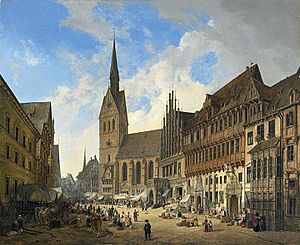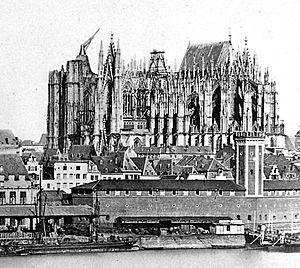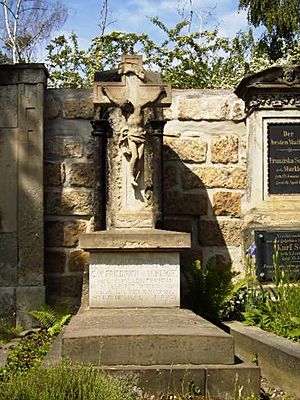Friedrich Schlegel facts for kids
Quick facts for kids
Friedrich Schlegel
|
|
|---|---|
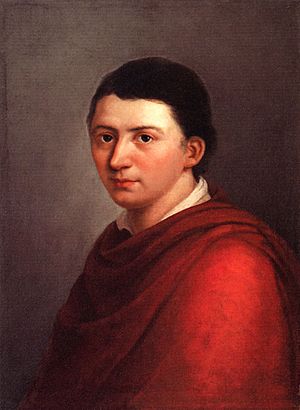
Friedrich Schlegel in 1801
|
|
| Born | 10 March 1772 |
| Died | 12 January 1829 (aged 56) |
| Alma mater |
|
| Era | 19th-century philosophy |
| Region | Western philosophy |
| School |
|
|
Main interests
|
Epistemology, philology, philosophy of history |
|
Notable ideas
|
|
|
Influences
|
|
|
Influenced
|
|
Friedrich Schlegel (born March 10, 1772 – died January 12, 1829) was an important German writer, thinker, and language expert. He was a poet, literary critic, philosopher, and philologist (someone who studies language and literature).
Along with his older brother, August Wilhelm Schlegel, he was a key person in a movement called Jena Romanticism. This was a time when artists and thinkers focused on emotions, imagination, and individual freedom.
As a young man, Schlegel studied law but became interested in classical literature. He started writing and giving lectures. He also helped create important journals like Athenaeum. Later in life, he became a diplomat and journalist in Austria. He died in 1829 when he was 56 years old.
Schlegel helped spread the ideas of the Romantic movement. He inspired famous writers like Samuel Taylor Coleridge and Adam Mickiewicz. He was also a pioneer in studying how languages are related, especially the Indo-European languages. He was one of the first to notice similarities between languages like Sanskrit, Latin, Greek, and German.
Contents
Friedrich Schlegel's Life and Work
Friedrich Schlegel was born in Hanover, Germany, on March 10, 1772. His father was a pastor at a church there. Friedrich first studied law at the University of Göttingen and University of Leipzig. But by 1793, he decided to focus completely on writing.
In 1796, he moved to Jena, where his brother August Wilhelm lived. There, he worked with other famous thinkers and writers like Novalis and Ludwig Tieck. They often discussed big ideas, including German idealism, which is a way of thinking about how our minds shape reality.
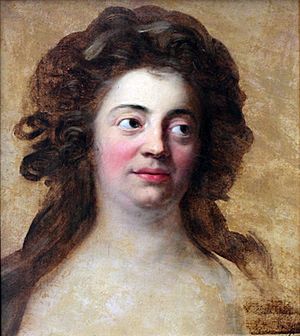
Schlegel wrote books about Greek and Roman history and poetry. He also studied famous authors like Dante Alighieri, Johann Wolfgang von Goethe, and William Shakespeare. In Jena, he and his brother started a journal called Athenaeum. In this journal, they shared short writings and ideas that explained the main principles of the Romantic movement. These writings are still seen as very important for understanding early Romanticism.
Later, Friedrich moved to Berlin. There, he met Dorothea Veit, who would become his wife. In 1799, he published a novel called Lucinde. This book explored the idea of complete individual freedom in everyday life. It was seen as controversial at the time. He continued his studies and lectured on philosophy in Jena.
In 1802, Schlegel moved to Paris. He continued to study languages, especially Sanskrit and Persian. He also edited a journal called Europa, where he wrote about topics like Gothic architecture. In April 1804, he married Dorothea Veit.
In 1808, he published a very important book called Über die Sprache und Weisheit der Indier (On the Language and Wisdom of India). In this book, he compared Sanskrit with Latin, Greek, Persian, and German. He noticed many similarities in their words and grammar. This idea that these languages are related is now widely accepted by linguists. He also suggested that people from India might have founded the first European civilizations, a theory known as the Out of India theory. While his ideas about language connections were groundbreaking, the "Out of India" model for European origins is generally not accepted today.
In 1808, Friedrich and his wife joined the Catholic Church in the Cologne Cathedral. After this, his political views changed, and he became more conservative. He moved to Vienna and in 1809, he became a secretary for the Austrian military. He worked as a journalist, writing strong messages against Napoleon. He even traveled with archduke Charles, Duke of Teschen during a war.
He published his collected Geschichte (Histories) in 1809. He also gave many lectures, which were later published as books like On Recent History (1811) and On Old and New Literature (1815). In 1814, he was honored with a knighthood.
After the Congress of Vienna in 1815, he worked for the Austrian embassy in Frankfurt. In 1818, he returned to Vienna. He also started a conservative Catholic magazine called Concordia. He began publishing his collected works and gave more lectures on the Philosophy of Life (1828) and the Philosophy of History (1829). Friedrich Schlegel died in Dresden on January 12, 1829.
His Wife, Dorothea Schlegel
Friedrich Schlegel's wife, Dorothea von Schlegel, was also a writer. She wrote a novel called Florentin (1802) and collected romantic poems from the Middle Ages. She also translated a famous book called Corinne by Madame de Staël. All of her works were published under her husband's name. Dorothea had two sons from her first marriage, Johannes Veit and Philipp Veit, who became well-known Catholic painters.
Key Writings and Ideas
- On the Aesthetic Value of Greek Comedy (1794)
- On Diotima (1795)
- Essay on the Concept of Republicanism (1796)
- Georg Forster (1797)
- On the Study of Greek Poetry (1797)
- On Lessing (1797)
- Critical Fragments (1797)
- Fragments (1797–1798)
- Lucinde (1799)
- On Philosophy. To Dorothea (1799)
- Conversation on Poetry (1800)
- On Incomprehensibility (1800)
- Ideas (1800)
- Characteristics and Criticisms (1801)
- Transcendental Philosophy (1801)
- Alarcos (1802)
- Journey to France (1803)
- History of European Literature (1803/1804)
- Principles of Gothic Architecture (1804/1805)
- On the Language and Wisdom of India (1808)
- German Museum (as editor), 4 volumes. Vienna (1812–1813)
- History of Old and New Literature (lectures) (1815)
See also
 In Spanish: Friedrich Schlegel para niños
In Spanish: Friedrich Schlegel para niños


